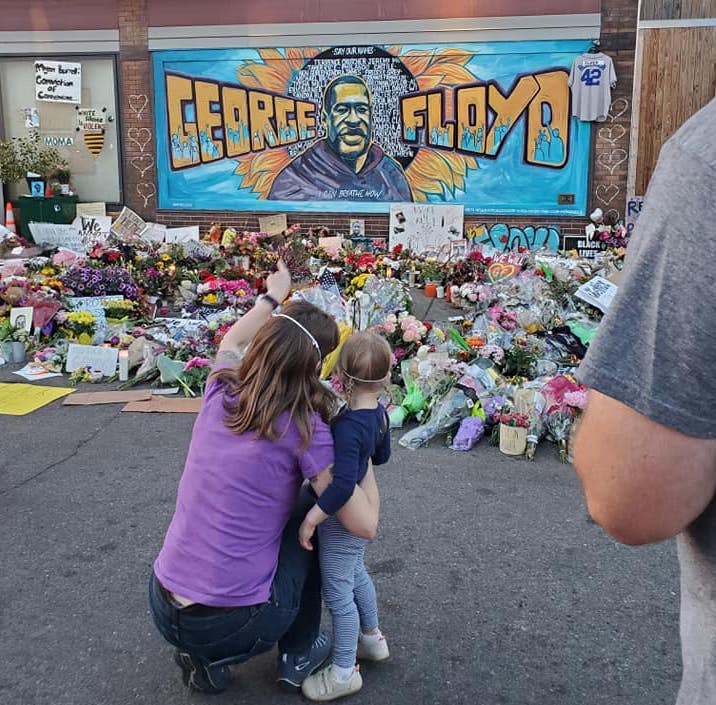Remote Anti-racism
You might want to adopt anti-racism practices, but concerns about COVID-19 may make you unsure what you can contribute or what role(s) you can take on right now.

Mother showing her young daughter the mural and shrine for George Floyd in Minneapolis, June 2020. Photo credit: Kate Kipling
This is where libraries and librarians can be a big help: we’re dedicated to finding answers to questions like “What can I do?” Before we get to that question, take a quick look at linked resources for other questions you might have right now:
What can I read?
See the BC Libraries Statement on Racism and Current Events, which includes a reading list, and the currently featured virtual book display, The Criminalization of Black Bodies.
What else are libraries doing to challenge racism?
Check out the online archives Documenting the Now, Project Stand, Blackavists, and Witness.org.
How do I find reliable news?
Read the BC Libraries Blog entry Finding Reliable News, and learn a straightforward process for fact-checking news items you find in your social media feed during a time of crisis when many breaking stories are developing quickly.
What can I do?
These resources provide recommendations and suggestions for how to get involved, but at a safe social distance:
- 12 Ways You Can Be an Activist Without Going to a Protest: This article, published after the events in Charlottesville, provides a list of recommendations for how to get started as a remote activist. (by Felicia Fitzpatrick in August 2017)
- Find Your Representative | house.gov: One of the most impactful ways of making your voice heard is by reaching out to your representatives in Congress directly. Don’t know who they are? This website will tell you, and give you all their contact information.
- How Can I Be An Activist Without Going To A Protest? This article provides additional ideas and resources for online and remote activism. (by Vanessa Pelz-Sharpe in November 2016)
- WhiteAccomplices.org: Drawing from ideas and resources developed by POC, this website provides support to White people who want to find ways to act for racial justice. (Compiled by Jonathan Osler)
- Activists pick up their phones and move online as coronavirus curbs protests: How have activists and other organizations, such as political campaigns, been impacted by the COVID-19 outbreak and limited in-person contact? How can those who want to volunteer for those campaigns and organizations help if there’s no door-to-door campaigning? This article details the new steps being taken and how everyone can get involved. (by Justine Calma in March 2020)
- Scaffolded Anti-Racism resources: If you want to share materials with friends, recognize that people are at different places on a continuum of knowledge about and comfort with anti-racism. This Google Docs list provides readings and exercises appropriate to where people are on the anti-racism continuum. (Created by Anna Stamborski, Nikki Zimmermann, and Bailie Gregory in the Divinity School at Princeton)
- Antiracism Resources The resources in this Google Docs list were compiled specifically for white parents to help raise children with anti-racist values. (by Sarah Sophie Flicker & Alyssa Klein in May 2020)
- Protesting Safely If you decide after all that you just can’t stay in your house while history is unfolding, this Vice News article will help you protect your digital safety when you join a protest.